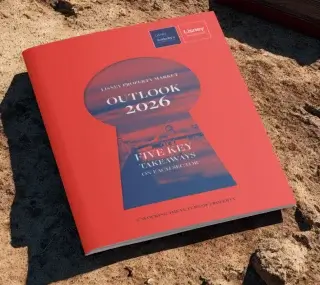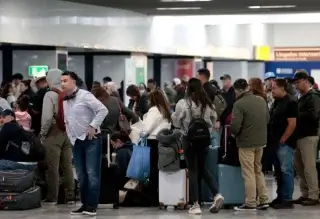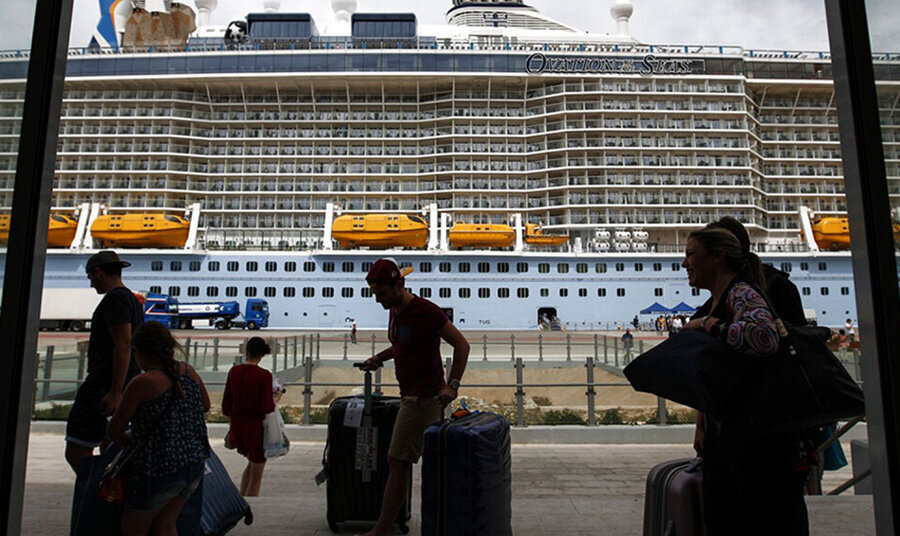read also
 Iceland’s Four-Day Workweek Five Years On
Iceland’s Four-Day Workweek Five Years On
 Mortgage Approvals in Ireland Slump Sharply in January
Mortgage Approvals in Ireland Slump Sharply in January
 Lisney Property Market Outlook: Irish Property Market Poised for Steady Growth in 2026
Lisney Property Market Outlook: Irish Property Market Poised for Steady Growth in 2026
 Inflation in Romania Slows to 9.6% but Remains Above Forecast
Inflation in Romania Slows to 9.6% but Remains Above Forecast
 Riots in Mexico Disrupt Air Links to Resort Destinations
Riots in Mexico Disrupt Air Links to Resort Destinations
 UK House Prices Stabilise After 2025 Slowdown
UK House Prices Stabilise After 2025 Slowdown
Cruise Costs Climb: Greece Introduces New Disembarkation Tax for Islands

Photo: Euronews
Starting July 21, 2025, a new cruise tax has come into effect in Greece, making island visits more expensive. A daily landing fee for cruise passengers now applies, including in top destinations like Mykonos and Santorini, Euronews reports.
New Rules
From now on, every tourist stepping off a cruise ship on Greek soil must pay a fixed fee—regardless of age or route. Cruise operators are responsible for payments, but the cost is typically passed on to passengers as part of the ticket or as a separate fee. Failure to comply may result in a port denying future entry or disembarkation rights.
Fees vary by season and destination. During the high season (June to September), passengers disembarking at Mykonos or Santorini will pay €20. The same rate applies to other ports, with an additional €5 charged for boarding. In the shoulder months—April, May, and October—the fee drops to €12 on major islands and €3 elsewhere. In winter, the rate is just €4 for Mykonos and Santorini, and €1 for other ports.
Operators must report passenger numbers via a special online platform and transfer payments quarterly. Port authorities will strictly enforce compliance. The measure complements Greece’s long-standing hotel accommodation tax and aims to reduce pressure on island infrastructure caused by mass tourism.
Greece’s Ports: 2024 Overview
In 2024, Greek ports welcomed 7.9 million cruise passengers—a 13% increase from 2023. Cruise arrivals rose from 5,230 to 5,490, according to TornosNews and INSETE. Piraeus saw 810 vessels (+7%) and 1.7 million travelers (+15%). Mykonos received 768 ships (+3%) and nearly 1.3 million passengers (+8%)—even though only 10,000 people live on the island. Santorini had fewer ships (–6%) but still saw a 4% increase in tourists, reaching 1.3 million.
Top passenger growth:
Heraklion: +35% (519,000)
Chania (Souda): +29% (280,000)
Corfu: +22% (816,000)
Other ports:
Lavrio: 146,000 (+19%)
Kefalonia-Ithaca: 186,000 (+16%)
Katakolo: 400,000 (+3%)
Rhodes: 458,000 (+1%) despite a 6% drop in ship visits
Analysts say 72% of cruise ship arrivals and 90% of visits occurred at these 10 ports. Bookings for 2025 are already up more than 10% year-over-year. The island infrastructure cannot cope with the surge, prompting the new tax. However, operators view the measure as unbalanced. Celestyal Cruises COO George Koumpenas criticized the fee as “a tax for the sake of tax,” noting it targets cruises specifically without solving overcrowding. He urged authorities to adopt a structured approach with quotas and cooperation instead of shifting the burden onto passengers and carriers.
Global Precedents
Greece isn’t alone in tackling overtourism financially. Since 2024, Venice has charged €5–10 for day visitors, including cruise passengers, during the April–July period to curb short-term visits.
Norway will introduce a flexible tourism tax in 2026, allowing municipalities to set up to 3% levies on lodging or cruise packages. Key destinations like Lofoten, Geiranger, and Bergen will be affected.
Barcelona’s city council approved a major overhaul of cruise operations. By 2030, the port will reduce its terminals from seven to five, capping daily passengers at 31,000 (down from 37,000). The city also plans to ban short-term rentals by 2029 and raised its tourist tax to €15 per night per person.
Mass tourism increasingly requires smart regulation—not just to protect infrastructure but to foster long-term sustainability. Governments are boosting oversight on rentals, limiting cruise traffic, implementing tourist taxes, and rethinking urban design strategies to balance resident, business, and traveler interests.
Read more:
Which countries raised tourist taxes in 2025
Schengen visa ranking shifted in 2024: Who gained, who dropped
Greek rental laws change again in 2025
Greece sees sharp drop in golden visa applications: April 2025 down 28.5%
Greece tightens migration laws: No legalizations, criminal penalties for illegals


